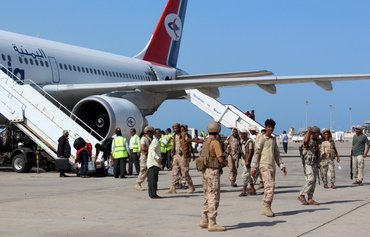ADEN -- The Iran-backed Houthis have tightened security measures at the southern entrance to Sanaa to the consternation of Yemenis travelling to the city from government-controlled areas, observers said.
The crackdown comes amid increasing public discontent with the Houthis' actions, and is widely perceived as a sign of fear on the part of the group.
A number of travellers headed to Sanaa from Aden and other government-controlled areas said plainclothes Houthi elements questioned them about the reasons for their travel at checkpoints on the outskirts of the city.
At a checkpoint in Yasleh, in the Sanhan district of Sanaa, private sector worker Saleem al-Harazi said Houthi elements asked him which city he had visited, and subjected him to an interrogation when he said he was returning from Aden.
![Vehicles pass through a Houthi checkpoint at the entrance of Bayt Baws district, south of Sanaa. [Haitham Mohammed/Al-Mashareq]](/cnmi_am/images/2022/09/14/37027-houthi-checkpoint-vehicles-600_384.jpg)
Vehicles pass through a Houthi checkpoint at the entrance of Bayt Baws district, south of Sanaa. [Haitham Mohammed/Al-Mashareq]
"I got scared when they told me to stand aside," al-Harazi said. "I showed them my identity card, and the interrogation lasted a few minutes, during which they asked me for my reason for travelling to Aden."
Al-Harazi said the Houthis asked him to provide his documents, which he did, as he had travelled to Aden to get passports for himself and his ailing father, who had accompanied him.
"As I looked for the documents to verify the reasons for my visit to Aden, one of the elements at the checkpoint began asking my father about the trip, and his answer was consistent with my answers, so they let me go," he said.
Travellers interrogated
On his recent return from a visit to Aden, Sami al-Zuraiqi told Al-Mashareq, he was stopped at the Yasleh checkpoint, where a Houthi element accused him of collaborating with the Arab coalition and travelling to collect his salary.
Al-Zuraiqi said he told the Houthi elements he had travelled to Aden to visit his family at Eid al-Adha, and works for a private telecommunications company.
"I was not released until they verified the documents I had on me and called my workplace to verify I work there," al-Zuraiqi said.
Inter-province bus driver Salah Mohsen meanwhile said the Houthi elements manning the Yasleh checkpoint asked him for the names of his passengers.
They checked passengers' names against their list of "wanted individuals", he said, and also questioned every passenger, some of whom were forced to disembark with their belongings.
Mohsen said a number of his passengers had travelled to Aden to collect their salaries from the government agencies that employ them.
Deputy Minister of Justice Faisal al-Majeedi blasted the action taken by the Houthis, saying it reflects the state of panic among them, amid the increasing manifestation of popular discontent with them.
Al-Majeedi said the Houthis' security checkpoints, which violate the truce presently in effect in the country, have become an excuse to arrest thousands of citizens, most of whom have nothing to do with politics.
Targeted officials
The Houthis' checkpoints and their interrogations compound the suffering of Yemenis in all provinces, amid a war that has been ongoing for eight years, economist Abdul Aziz Thabet said.
Thabet said the Houthis have compiled lists that include the names of former government officials and of opposition journalists and activists "to prevent them from entering Sanaa".
These individuals are arrested "if they pass through their security checkpoints".
One reason for stopping and detaining individuals at Yasleh checkpoint and elsewhere is to find government employees who need to travel to Aden to receive their salaries, he said.
Another reason is finding and arresting individuals who are related to government officials, in order to subsequently exchange them for prisoners affiliated with the Houthis who are detained in government prisons, he added.
"Approximately one million employees in Sanaa and Houthi-controlled provinces do not receive their salaries from the Houthis, and about 10,000 of them need to travel to Aden to collect their salaries, which the Houthis consider a crime."
Meanwhile, the Houthis have failed to abide by their commitment to use the oil revenues generated in the port of al-Hodeidah to pay employee salaries, as stipulated by the Stockholm Agreement of 2018, Thabet said.
The Houthis' actions add to the troubles of the local population, as they are forced to use side roads between provinces to avoid confrontations, economist Faris al-Najjar told Al-Mashareq.
This option takes more effort and time and increases travel expenses, he said.
The Houthis do not care about peace, he added, accusing the group of taking advantage of the truce to buy time to organise their ranks.

![Houthi elements man a checkpoint at the entrance of Bayt Baws district, south of Sanaa, in September. [Haitham Mohammed/Al-Mashareq]](/cnmi_am/images/2022/09/14/37026-houthi-checkpoint-Sanaa-600_384.jpg)






